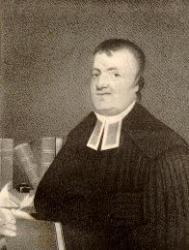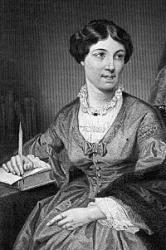Planning worship?
Check out our sister site, ZeteoSearch.org,
for 20+ additional resources related to your search.
- |
User Links
Person Results
‹ Return to hymnal


Export as CSV
J. W. Cunningham
1780 - 1861 Hymnal Number: d143 Author of "How cheering the thought, that the spirits in bliiss" in The Christian Melodist, a Collection of Popular Songs, for Use in Public and Social Meetings ... Cunningham, John William, M.A., was born in London, Jan. 3, 1780, and educated at St. John's College, Cambridge, where he graduated in honours, and subsequently became a Fellow of his College. In 1802 he was ordained to the Curacy of Ripley, in Surrey. The following year he removed to Ockham, and later to Clapham, where he was curate to the Rev. John Venn, who was the original of Berkeley in The Velvet Cushion. In 1811 he was presented by his family to the Vicarage of Harrow, which he held for fifty years. He died Sept. 30, 1861. He published, in addition to pamphlets on various subjects:—
(1) World without Souls, 1805; (2) The Velvet Cushion, 4th ed. 1814; (3) De Ranee, a Poem, 1815; (4) Morning Thoughts on the Gospel of St. Matthew, 1824; (5) Morning Thoughts on the Gospel of St. Mark, 1827. The two series of Morning Thoughts contained hymns which were given without any signature. As there is an acknowledgment that with the verse, in the first case he was assisted by "a friend," and in the second “by friends," it is impossible to distinguish his work from that of his "friends."
With his name and publications the following hymns are associated:—
1. As the sweet flower that scents the morn. Death of an Infant. This poem appeared in The Velvet Cushion (4th ed. 1814, p. 157), in 6 stanzas of 4 lines. ln1826 it was given in a revised form as a hymn in 3 stanzas of 4 lines in the American Episcopal Psalms & Hymns, No. 127. In the Unitarian Hymns for the Church of Christ (Hedge & Huntington), 1853, No. 762, it is increased to 4 stanzas. It has been attributed to Allan Cunningham, but in error.
2. Dear is the hallowed morn to me. Sunday Morn¬ing. This was given in Oliphant & Sons' Sacred Poetry, 4th ed., 1822, in 8 stanzas of 4 lines, and signed "Cuningham." In 1833 Bickersteth gave stanza i.—iii., vi., as No. 639 in his Christian Psalmody, beginning, "Dear is to me the Sabbath morn." This has been repeated in English and American collections.
3. From Calvary a cry was heard. Good Friday. Published in his Morning Thoughts on St. Matthew, 1824, p. 103, in 5 stanzas of 4 lines. It is in somewhat extensive use In America, and sometimes in 4 stanzas as in Dr. Hatfield's Church Hymn Book, 1872, No. 460.
4. How cheering the thought that the spirits in bliss. Ministering Angels. Published in his Morning Thoughts on St. Matthew, 1824, p. 15, in 2 stanzas of 4 lines. In Bateman's Sacred Melodies, the Scottish Presbyterian Hymnal for the Young, 1882, &c, and several American collections, it is given as "How [dear is] delightful the thought that the angels in bliss."
5. The God of Israel never sleeps. Watchfulness. Published in his Morning Thoughts on St. Mark, 1827, p. 103, in 3 stanzas of 6 lines. As No. 548 in Kennedy it is in an altered form. [William T. Brooke]
--John Julian, Dictionary of Hymnology (1907)
J. W. Cunningham
Jeremy Belknap

1744 - 1798 Person Name: J. Belknap Hymnal Number: d388 Author of "Who has our report believed" in The Christian Melodist, a Collection of Popular Songs, for Use in Public and Social Meetings ... Belknap, Jeremy. (Boston, Massachusetts, June 4, 1744--June 20, 1798, Boston). He graduated from Harvard College in 1762; taught school for four years; in 1766 accepted a position as assistant to Rev. Jonathan Cushing of Dover, New Hampshire, and in 1767 was ordained, serving in that parish until 1786. In 1787 he became minister of the Federal Street Church (now the Arlington Street Church), Boston, which he served until his death. Harvard gave him the honorary degree of Doctor of Divinity in 1792. He was the author of a three-volume History of New Hapmshire; of a petition (1788) for the abolition of the slave trade; and of other books and essays; and formed the plan for the Massachusetts Historical Society, organized in 1791. He wrote no hymns but made an important contribution to American hymnody in his collection Sacred Poetry: consisting of Psalms and Hymns adapted to Christian devotion in public and private. Selected from the best authors, with variations and additions (Boston, 1795), which ran to many editions. His intention was to provide a book acceptable to both the conservative and the liberal wings of Congregationalism, to bridge the widening gap which resulted in the formation of the Unitarian denomination a generation later. In this he failed, for only the liberal churches accepted it, though it was widely used by them for 40 years, being much of the best of the period. It includes 300 hymns from the best English sources, and was the first to introduce to Americans the hymns by Anne Steele. The only American hymns in the collection are Jacob Kimball's metrical version of Psalm 65 and Mather Byles' "When wild confusion rends the air."
--Henry Wilder Foote, DNAH Archives
Jeremy Belknap
Amos Sutton Hayden
1813 - 1880 Person Name: A. S. Hayden Hymnal Number: d87 Author of "Five porches for the sick were made" in The Christian Melodist, a Collection of Popular Songs, for Use in Public and Social Meetings ... Hayden, Amos Sutton. (Youngstown, Ohio, June 17, 1813--September 10, 1880, Collamer, Ohio). Disciple. He was the founder in 1830 of The Wester Eclectic Institute in Hiram, Ohio, which became Hiram College> "He had a natural gift for music and was one of the earliest compilers of hymns and tunes for use in the churches of the Disciples." (Dictionary of American Biography) Compiled An Introduction to Sacred Music (1834), Sacred Melodeon (1849), and The Hymnist; the 1834 book was probably the first tunebook in the Campbell tradition. Hayden was a member of the five-man committee "mutually agreed on" by Campbell and the national Disciple convention to prepare the Christian Hymn Book of 1865 (two of his hymns appeared in this); member of a similar committee to make the 1882 revision of this book's successor, The Christian Hymnal, but died before the work began (one of his hymns appeared in the revised book); he also composed hymn tunes. His brother, William Hayden (1799-1863) is referred to in the DAB as "the Sankey of his day." Both Haydens were associated with the evangelist Walter Scott.
--George Brandon, DNAH Archives (with addition by Mary Louise VanDyke)
Amos Sutton Hayden
Thomas Cleland
Hymnal Number: d48 Author of "Hallelujah, hallelujah, glory be to God on high" in The Christian Melodist, a Collection of Popular Songs, for Use in Public and Social Meetings ...
Thomas Cleland
Silas W. Leonard
1814 - 1870 Hymnal Number: d331 Author of "There's joy in heaven, thrilling joy" in The Christian Melodist, a Collection of Popular Songs, for Use in Public and Social Meetings ... Leonard, Silas White. (Louisville, Kentucky, 1814--1870 near Centralia, Illinois). Disciples of Christ. Adopted at parents' death by a Captain White, a Baptist, in Ohio. Taught vocal music and preached primitive gospel. Published The Christian Psalmist with A.D. Fillmore, 1848, first hymnal having music in use among Churches of Christ, figure faced notes. Moved from Jeffersonville, Indiana to farm in Centralia, Illinois, 1856. Continued preaching, published a new Psalmist with both kinds of notes. See History of the Disciples of Christ in Illinois, 1819-1914 (1915) by N.S. Haynes.
--Jean E. Garriott, DNAH Archives
Silas W. Leonard
Sebastian F. Streeter
1810 - 1864 Person Name: S. F. Streeter Hymnal Number: d145 Author of "How gracious the promise, how soothing the word" in The Christian Melodist, a Collection of Popular Songs, for Use in Public and Social Meetings ... Streeter, Sebastian Ferris. (Weare, New Hampshire, July 7, 1810--August 23, 1864, Baltimore, Maryland). Son of Sebastian Streeter, 1783-1867. A Universalist layman, he wrote a hymn beginning "How gracious the promise, how soothing the word," which is included in Church Harmonies: New and Old, 1895.
--Henry Wilder Foote, DNAH Archives
Sebastian F. Streeter
C. W. Ainsworth
1817 - 1851 Hymnal Number: d132 Author of "Here o'er the earth as a stranger I roam" in The Christian Melodist, a Collection of Popular Songs, for Use in Public and Social Meetings ...
C. W. Ainsworth
Harriet Martineau

1802 - 1876 Hymnal Number: d208 Author of "Lord Jesus, come; for here Our path through wilds is laid" in The Christian Melodist, a Collection of Popular Songs, for Use in Public and Social Meetings ... Martineau, Harriet, was born at Norwich, June 12, 1802, and died at Ambleside, June 27, 1876. Best known as the writer of Illustrations of Political Economy, Retrospect of Western Travel; two novels, Deerbrook and The Hour and the Man; Eastern Life, Past and Present; a History of the Thirty Years’ Peace, and various other works. Her first publication was a book of Devotional Exercises, with hymns appended to each Exercise, and her hymns also belong to what she speaks of in the Autobiography as her "Unitarian" period. Five of them appeared in A Collection of Hymns for Christian Worship, printed in 1831 for the congregation of Eustace Street, Dublin, and edited by her brother, the Rev. James Martineau.
1. All men are equal in their birth. Human Equality.
2. Lord Jesus! come; for here. Jesus desired. Sometimes given as(1) "Come, Jesus, come, for here"; (2) and "Thy kingdom come, for here."
3. The floods of grief have spread around. In Affliction.
4. What hope was thine, O Christ! when grace. Peace.
5. When Samuel heard, in still midnight . Samuel.
The Rev. J. R. Beard's Collection 1837, contains 1, 2, 4 and 5, and:—
6. The sun had set, the infant slept. Gethsemane. The Rev. W. J. Fox's Hymns and Anthems, 1841, contains No. 1, and
7. Beneath this starry arch. Progress . [Rev. Valentine D. Davis, B.A.]
-- John Julian, Dictionary of Hymnology (1907)
Harriet Martineau
W. E. Miller
1766 - 1839 Hymnal Number: d268 Author of "Our souls by [in] love together knit [drawn] [joined]" in The Christian Melodist, a Collection of Popular Songs, for Use in Public and Social Meetings ...
W. E. Miller


 My Starred Hymns
My Starred Hymns


